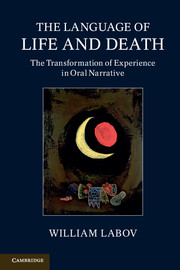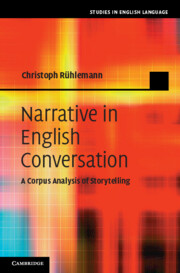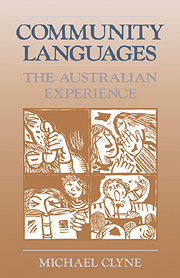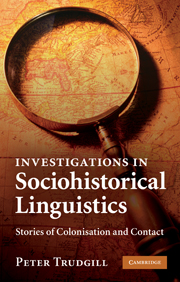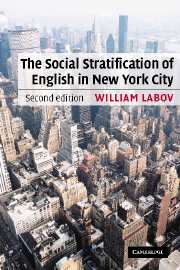The Language of Life and Death
We share the experience of others through the stories they tell of the crucial events in their lives. This book provides a rich range of narratives that grip the reader's attention together with an analysis of how it is done. While remaining true to the facts, narrators use linguistic devices to present themselves in the best possible light and change the listener's perception of who is to blame for what has occurred. William Labov extends his widely used framework for narrative analysis to matters of greatest human concern: the danger of death, violence, premonitions and large-scale community conflicts. The book also examines traditional epic and historical texts, from Herodotus and the Old Testament to Macaulay, showing how these literary genres draw upon the techniques of personal narratives. Not only relevant to students of narratology, discourse and sociolinguistics, this book will be rewarding reading for anyone interested in the human condition.
- Expands a widely used framework for narrative analysis to new and more complex types of narrative such as epic and historical
- Shows how narrators take advantage of the special features of their language to alter the listener's perception of who is responsible
- Provides a wide range of human experience of inherent interest to the reader, such as narratives which deal with the escalation of violence, contact between the dead and the living, premonitions of future events and community confrontations
Reviews & endorsements
'Erudite, thoughtful and personal, an engaging book to be read and pondered, as much for the fundamental issues raised and the fascinating data analyzed as for the solutions offered.' Neal R. Norrick, Saarland University
'Labov’s vision of our human desire to make sense of the most terrible and terrifying of our experiences is remarkable, panoramic, and a poignant tribute to the value of listening to each other keenly.' Alyssa McCabe, Journal of Sociolinguistics
Product details
August 2013Paperback
9781107656819
248 pages
226 × 151 × 11 mm
0.41kg
2 b/w illus.
Available
Table of Contents
- 1. Introduction to the language of life and death
- 2. Narrative analysis
- 3. The escalation of violence
- 4. Confrontations with death
- 5. Premonitions and communication with the dead
- 6. Margie Knott: her confrontation with the neighbors
- 7. Gloria Stein: 'They stoned the house'
- 8. Rose Norman: the death of her younger sister
- 9. Mary Costa: the death of her youngest daughter
- 10. Cache County
- 11. The vernacular origin of epic style
- 12. Historians' use of narrative
- 13. Thomas Babington Macaulay: the death of Monmouth
- 14. S. T. Bindoff: the death of Elizabeth
- 15. 2 Samuel: the death of Absalom
- 16. The narrative view of death and life.

